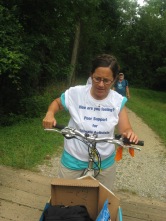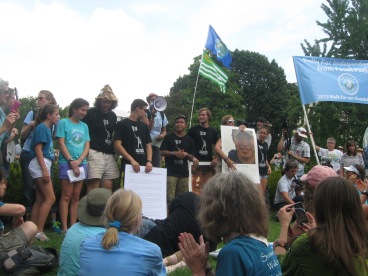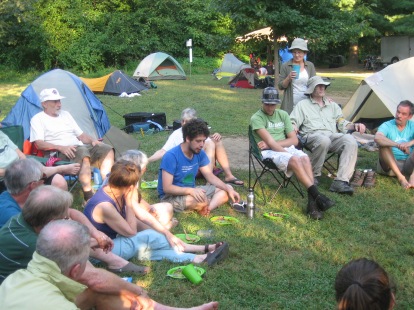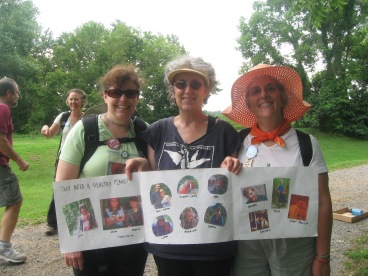silenced in the courtroom
August 23, 2013
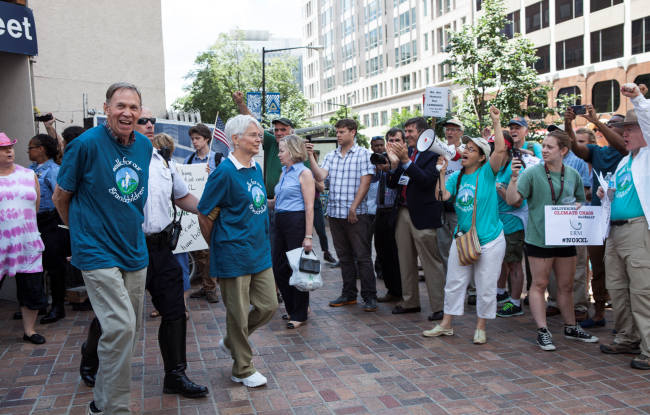
A joyous Neil and Linda Swanson were escorted in cuffs from the ERM office building.
// photo from tulanegreenclub.blogspot.com
Steve Norris carried a copy of Gandhi the Man, but he knew he wouldn’t get to read a passage to the judge. Alex Hunter-Nickels sang a bit with a few others, but quietly while sitting on a bench outside the courtroom. We gathered in a chatty, hugging, even boisterous bunch near courtroom and were shushed several times. Once inside, we were admonished, and then reminded, not even to whisper. Steven Donkin was told to stop reading his book, a biography of black-listed Hollywood Ten screenwriter Dalton Trumbo. No reading in the courtroom.
For a time, the ERM-54 were muzzled.
Over the past two weeks, the 54 protesters arrested last month in a spirited sit-in at the office building of Keystone XL pipeline apologist Environmental Resources Management (ERM) were arraigned in DC Superior Court. Many, along with their supporters in the courtroom, had also participated in all or part of the 100-mile Walk for Our Grandchildren last month. The ERM protest came on the last day of the walk. Most of the men were arraigned last week, most of the women this week. As arranged by pro bono attorney Jeffrey Light, who also has represented Occupy participants, the protesters pleaded not guilty. The charge: unlawful entry.
Other cases were called first, mostly teens and 20-somethings charged with marijuana possession. While waiting outside the courtroom last week, an orange-jumpsuited prisoner manacled to a wheeled chair was pushed past us. He never appeared in court though. One defendant didn’t like his attorney, although we couldn’t hear the details because the judge switched on white noise when lawyers spoke with clients. One lucky man had all charges dropped and was freed. Another seemed to be the victim of a bait-and-switch. His marijuana charge was dropped, but he was served with a subpoena to appear before a grand jury.
And then the names were called, in bunches of 10 or so:
United States v. Neil Swanson
United States v. Joseph Firman
United States v. Michael Bagdes-Canning (misspelled)
United States v. Steven Donkin
United States v. Melinda Tuhus
United States v. Lillian Marotta (who turned 20 on her day in court)
United States v. Deborah Woolley
United States v. Mary Liepold
And on and on. The ERM-54 had a right to remain silent, which they did, stating their names or indicating they understood the terms of their plea only when asked.
The assistant U.S. attorney said “all the young ladies are diversion eligible,” as were the men. Everyone agreed to return, most on Sept. 9, to sign the “stet” agreement, which is not a simple or inexpensive matter for those coming from New York, Asheville, NC, Pennsylvania, even Seattle. Light said the stet agreement means the charges will be dismissed as long as the defendant isn’t arrested again in the next six months. Which might be hard for people like Norris and his wife, Kendall Hale, who are fighting on many fronts in what is becoming a backwater of a state: North Carolina.
Everyone probably will also be ordered to stay away from ERM’s offices at 1776 I St. NW in DC. Community service or a fine could be part of the terms, but Light said he doubted that. After two years, Light said, the arrest record could also be expunged.
Then everyone had to sign a form indicating the conditions of release. The court, I kid you not, makes carbon copies of this form. Are they taunting us? The ERM-54 had shouted to the world about the Keystone XL pipeline, ERM’s lies and “game over for the planet” from all this carbon we are digging up and spewing into the atmosphere. And now a form with carbon copies.
Then each defendant left the courtroom. Joseph Firman raised his fist and smiled on the way out. Others hugged or kissed friends there for support. Or brandished the court’s form like a badge of honor.
From there, everyone had to walk to a nearby room to provide proof of address (A driver’s license is not proof. Those without a piece of mail or a bill on hand have a letter sent to the address; when it arrives, they have to call to confirm receipt.)
And then, like every other defendant, they had to pee in a cup in the presence of an officer of the court to make sure no cheating was going on. They are trying to stop climate catastrophe, but the ERM-54 can’t be on drugs while they’re at it. Or poppy seeds. Bill Shauman wrote in an email that he “had a slice of Whole Foods (how bourgeois can a protester get?) black Russian rye loaded with them that morning. So I had forebodings.” When he returned the next day with proof of address, he learned “that sure enough I had tested positive for opiates. So now [I’ve] got to meet my case manager. No use explaining about the rye bread — they have heard all those excuses before. And this is a no-bullshit environment. I dare say I’ll pass the next two tests, but it’s nice to know that if by chance I didn’t, DC would refer me to a free treatment program.”
Turns out getting arrested for the sake of future generations is not hassle-free. “We have to be willing to be inconvenienced,” said Woolley, who took a red-eye flight from Seattle to arrive in time for the arraignment and arranged to return in October when fares are reduced. We might have to get arrested, pee in a cup, walk instead of drive. “We might have to live a more inconvenient lifestyle. Convenience has gotten us into this fix,” she said.
The ERM-54 and their supporters certainly got a taste of the criminal justice system.
Jerry Stewart found it “a bit jarring to see all of our names up on screens, listed with the crimes we were accused of committing. Seeing criminals in handcuffs shuffling around with lawyers really impressed upon me the realities of the American prison system and what being in jail actually means.”
Shauman said, “Court personnel treated us all, black and white, quite respectfully — I am not used to being addressed as ‘mister’ — instructions were easy to understand, and you had to walk only a little way to get to the next processing point. All in all, a fleeting glimpse of a world that all too many residents of the city know well.”
Discussion before and after the hearing highlighted some bewilderment or perhaps frustration at having to plead “not guilty” for an action we all deemed imperative.
The day before the first arraignment, Valerie Serrels — mother of the iMatter teens Grant and Garrett, who participated in the Walk and the ERM protest but didn’t risk arrest because they had to speak at a climate rally the next day — emailed an article by Jeremy Brecher in Waging Nonviolence. He lays out the iMatter “public trust” argument that governments should protect the commons: “Governments will no doubt continue to treat protesters who block pipelines, coal mines and power plants as criminals. But such governments come into court with dirty hands, stained by their dereliction of the duty to protect the common inheritance of their own people,” he wrote. “Those who blockade coal-fired power plants or sit down at the White House to protest the Keystone XL pipeline can — and should — insist that they are simply exercising their right and responsibility to protect the atmospheric commons they own along with all of present and future humankind.
Before the second day of arraignments, Shireen Parsons handed out a 1964 quote by Mario Savio printed on a little slip of paper: “There is a time when the operation of the machine becomes so odious, makes you so sick at heart, that you can’t take part; and you’ve got to put your bodies upon the gears and upon the wheels, upon the levers, upon all the apparatus, and you’ve got to make it stop.”
The ERM-54 and its supporters wanted to expose corporate collusion and government complicity and coverup in the rush to extract and transport the tar sands carbon bomb. And days after the arrests, the State Department announced it would investigate ERM’s conduct in preparing the pipeline environmental impact statement. Couldn’t these cases be put on hold until the State Department investigation is complete? Or couldn’t the group plead the action was a “necessity” because of climate change? But Light said those would not be winning defenses.
“Our civil disobedience involved regular folks pointing to criminal behavior perpetrated by a large corporation acting with impunity,” Bagdes-Canning said. “We do a perp walk, and even though many of these conflicts and ties were revealed years ago, ERM to date has not been charged with anything and no one is put in cuffs but us. … In Pennsylvania, we call our Department of Environmental Protection (DEP) Don’t Expect Protection because the health and safety of the citizens of Pennsylvania are secondary to the bottom line of industry. Apparently, things in Washington, D.C., are not much different.”
Parsons wrote in an email: “I found the whole experience Kafkaesque, particularly when I compared the ‘crimes’ of all those people and us, a bunch of old farts who care about the Earth and all of Earth’s creatures, (including everyone’s children and grandchildren) — against the crimes of our government and the corporations that own it.”
Yes, we were muzzled, Norris said. “The court wants it that way. It’s not set up to give us a voice. Geniuses like the Berrigans figured out ways to do that, turning the courtroom into a theater with a performance that they controlled. I hope someday we can do that. But that takes creativity, courage and planning.”
So, the ERM-54 was silenced for a day. But they and their supporters emerged united and looking for the next step.
Steven Yoder found a “sense of connection” he had not anticipated and deeply appreciates. “As we witnessed several other persons going through the arraignment process, I felt bad for them not having anyone to support them and share in their distress. It strikes me that a part of what we were protesting is the breakdown of community that allows dangerous and destructive things like building pipelines to transport more dirty oil to happen,” he wrote in an email. “It takes communities to stand up to evil, and in our action we have created a new community. Witness the flurry of email communication since the action! We can’t stop talking with each other, encouraging each other, helping each other!”
In an email, Norris wrote: “I get a sense that this struggle is escalating. 2000 climate activists or maybe more have been arrested in the last year. We are approaching the energy & power we had in the 60s when we ended Jim Crow, challenged the War machine so the US had to get out of Vietnam, started the women’s movement, gay rights movement, & environmental movement. These eventually brought nuclear power to its knees & ended the nuclear arms race, and enabled Latin American countries to throw off some if their chains.” He said the Walk for our Grandchildren started as a “political project” to stop the KXL pipeline and end our dependence on fossil fuels. “ But as we walked it morphed as well into a pilgrimage. I did not expect that at all. And what to do with the pilgrims and the sacred moving place we arrived at and the energy we created … that’s our challenge.”
–elisabeth hoffman
footsteps toward our future
August 1, 2013
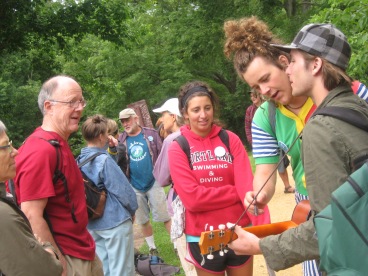
At right, Lillian Marotta, Alex Hunter-Nickels and Grant Serrels confer about music before heading to the trail.
What a walk we had.
Last week, we walked for our children and grandchildren, great-grandchildren and siblings, nieces and nephews, friends and strangers. The oldest walker was 78, the youngest, 11 (grandfather Mahan Siler and his granddaughter Leigh). We walked for a future free of enslavement by fossil fuels that have provided an abundant lifestyle for some but at escalating cost to humans and other species, to plants, water and air and future generations.
About 25 people walked 100 miles, from Camp David to the White House, while about 50 others, including me and several others from the Climate Change Initiative of Howard County, joined at Harpers Ferry, where John Brown tried to start a rebellion against slavery several years before the Civil War. Along the way, other walkers joined for a day or two. Over the days, we walked on the C&O trail, once part of the Underground Railroad. As organizer Steve Norris said on that first night in Harpers Ferry, we felt the spirit of Harriet Tubman and the movement to break the bonds of slavery, just as we are trying to break the bonds of fossil fuels. Slavery and fossil fuels, both cheap energy sources for those with power. One immoral on its face, the other increasingly so.
The Walk for Our Grandchildren expanded my world. I became part of a community of walkers who had given a great deal of thought to where we’ve been, where we’re heading and where we ought to be going. For a week, we shared stories and photos, meals and snacks, sunblock and ibuprofen, bandages and a lack of showers. We headed for Noah’s medic tent in the late afternoon to soak blistering feet. We headed for the medic tent in the early morning for a new layer of moleskin, gauze and duct tape so we could walk another day. Grumble, the aptly named cook with Seeds of Peace, organized meals of steel cut oats, scrumptious hash browns, blueberry pancakes, rice and lentils, fresh fruit, hummus and much more. Those who crossed the ferry into Leesburg Tuesday evening for a small detour to a protest organized by a new 350.org chapter enjoyed a potluck banquet prepared by members of the Unitarian Universalist Church of Loudon County. A few from the Leesburg group, at the request of a Leesburg councilwoman, stayed into the evening to testify at a town meeting and possibly helped stop a new highway of fossil-fueled vehicles. The first day back home was jarring. As Laura Narayani emailed: “I just can’t figure out why I’m sleeping inside and why no one is cooking for me now : )”
The Walk for Our Grandchildren also contracted my world. My days were measured in steps, in relative slow motion compared with the world I’d left behind. We were quiet by 10 p.m. and started rising with the sun. We saw the moon rise in Leesburg. We walked with butterflies and by turtles, fish, snakes, herons, deer. We were invited inside the Harpers Ferry youth hostel to take shelter from a violent thunderstorm. Each day, the trail was different. Sometimes the canal was filled with algae, or the trail was covered with sycamore bark. We stopped at a lock house, where perhaps 150 years ago a family had lived in its four rooms without electricity. That family had walked 50 feet up a hill to get water from a spring. We, too, often had to walk that far or more to the water pump near our campsite. Water became precious.
When we all lived at a human scale, before industrialization, the atmosphere contained 280 ppm of CO2. By using fossil fuels, we have accomplished engineering, medical and technological feats. But we also have managed to do something no other species has done: We have changed the atmosphere. At 400 ppm, a level never before seen by humans, we are melting glaciers, acidifying the oceans, worsening droughts, fueling storms, driving wildfires, wiping out species. If everyone on the planet consumed resources at the rate we do in this country, we would need eight Earths.
And so, for a week, we lived on a human scale, nomads wandering toward a new civilization that we hope will be untethered from fossil fuels. And we pledged, by whatever peaceful means necessary, to reinvent a more just, more human-scaled future.
Here’s Steve’s message on a banner directed to President Obama: When in the course of human events it becomes self evident that the greed and avarice of the 1% are a serious threat to the lives and well-being of the 99% as well as the animals and vegetation we share this planet with, it behooves courageous leaders to make difficult and courageous decisions. STOP KXL!
I thought the teens and 20-somethings on the walk would resent us old-timers for having bequeathed this mess. Instead of looking back and laying blame, though, they are looking forward, feeling the urgency. “We must be the ones to act. It can’t be, ‘Someone will figure it out.’ That someone must be us,” said Jerry Stewart of Aldie, VA, who walked for his days’ old nephew. Jerry walked from Camp David, as did Lillian Marotta who endured horrendous blisters to try to stop the Keystone XL pipeline and the suffering of poor communities hit hardest by climate change. Wild-haired (ok, most of us had wild hair) troubadour-philosopher Alex Hunter-Nickels, who woke us most mornings with his singing and ukulele and said he was as old as the cosmos (or 18), is working for “dignity of all life forms, including the banker, the senators and the blade of grass.” He says “Wow” a lot, not as trite rejoinder, but in genuine awe of the present. He’s weary of hate and evil and picking enemies. “If you recognize [our] interdependence with plants and animals, then you can’t cut down the trees without recognizing their dignity and live a lifestyle of complete disregard of all life forms.”
Benjamin Bushwick, who walked from Harpers Ferry, sometimes barefoot, spoke eloquently, passionately and with no notes at a rally in Leesburg and a civil disobedience action Friday in DC at Environmental Resources Management, the firm that assured the State Department that the Keystone XL pipeline would be just fine for the environment – after lying about its ties to pipeline builder TransCanada. Here’s Benjamin: “If we continue business as usual, if we continue burning fossil fuels, we are heading down the road to atmospheric hell on earth incompatible with human life as we know it…. I’m marching because I matter. I’m marching because my future matters. My future matters more than politics. My future matters more than frivolous executive salaries. It matters more than the economic well-being of shareholders. And most importantly, it matters more than a primitive addiction to an outdated source of energy. We have all the technology to make this transition.” He doesn’t expect the “muckety-mucks” with titles to have a change of heart: “This struggle is really about taking control back into our own hands … taking power back into the youth.”
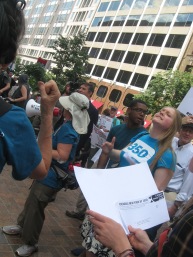
At the rally outside Environmental Resources Management: “ERM’s the worst around; leave the tar sands in the ground.”
Jerry, Lillian and Alex were among the 54 arrested at the civil disobedience action Friday when they refused to leave the ERM offices. They were among six who hooked themselves together there in a contraption that looked a little like a mini-tar-sands pipeline, and the police had to cut them out. Never before have I been part of such a powerful and targeted action. Inside, but also outside the building, we seemed to move as one, like a school of fish. I asked Jerry: Who was making decisions inside the building? “We all were,” he said. Lillian said she couldn’t stop smiling for her mug shot. By the third try, officials wanting a serious look gave up and went with the mug with the small smirk. Those jailed reported singing and chanting, inside the ERM building and in their cells.
Come on people
Can’t you see?
We don’t got
No planet B.
And …
Giving advice is not so cool
When you’re in bed with fossil fuel
And the jailed men sang … in a round:
Dear friends, dear friends
Let me tell you how I feel
You have given me such treasures
I love you so.
On the last morning, there was silence — because Alex had broken all but one string on his ukulele in the excitement of the civil disobedience action the previous day. We woke in St. Stephen’s Episcopal Church, where we had slept on the sanctuary floor, like refugees from an overheated planet. But then Alex started playing the church piano. And we all packed up one last time and headed in a grand march to the White House for speeches and a reading of the Declaration of Independence From Fossil Fuels. Garrett and Grant Serrels, 17-year-old twins who walked from Camp David and are from iMatter: Kids vs Global Warming, brought the scroll with the Declaration and 40,000 signatures to the rally. They are part of iMatter’s lawsuit, now on appeal, against the federal government for failing to protect the atmosphere as a public trust. “I fear for my future,” Garrett said. “Climate change has a human face.”
At the end of the rally, the adults encircled the youth, and Mahan Siler had us look at each other, to feel how much we need each other, youth, adults and elders. And we pledged: “We … declare that we as a community… ought to be free and independent from lifestyles and forms of energy that cause global climate change.”
Before parting ways, we met one more time in the shade of trees near the White House, held hands and sang, in a round:
Dear friends, dear friends
Let me tell you how I feel
You have given me such treasures
I love you so.
— elisabeth hoffman
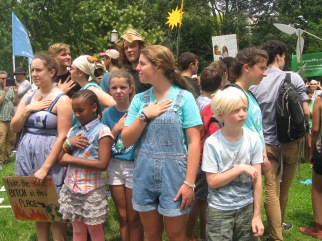
At the final rally in DC, those under 20 are in the center of a circle of adults who pledge to do all we can to leave a livable planet.
